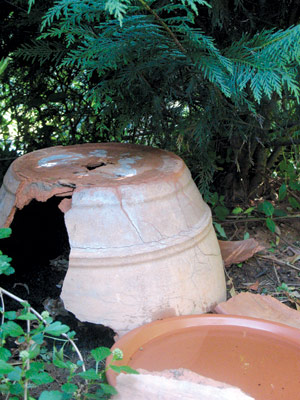It took me a long while to start wondering about toads. I spent my childhood in a clime where summer lasted eight weeks at best and yet, on those precious warm days, our farmland hopped with brown flurries of Bufo americanus (the appropriately burly Latin term for the common American garden toad). As a teen in the tropics, I recall a lime-bright tree frog chronically attached to my grandmother's stucco door frame like a little leaf blown flat by a hurricane.

In these mountains, where I've been for most of two decades, I didn't perceive a lack of wild hoppers till I was out of my scattered, myopic 20s. Perhaps they were there and I was simply too self-centered to notice. Or maybe it had something to do with the passel of cats my sister and I kept all those years. Just as frogs and toads help control the population of undesirable bugs, marauding felines have a decided impact on the density of wild critters in one's backyard.
I know they're around, though. When we were first married, my husband was reading subterranean water meters for the city, and he would snap photos of underground toads on his cell phone and e-mail them to me at work to brighten my day. More recently, my son and I took a trip to The North Carolina Arboretum where, in between netting tadpoles from a thicketed pond, the preschoolers in the Wee Naturalists program got a good look at some delightful fat specimens taking a dip in the arboretum's main courtyard fountain.
"We have a lot of toads visiting that pool each year," staffer Jonathan Marchal confirms. But the water is chlorinated, so he and other employees routinely move the toads' eggs to more natural environments.
Afterward, I became mildly obsessed with spotting more amphibians preferably closer to home. I realized I hadn't spied a toad on my own property since neon-zebra slouch bags were trendy the first time around. Glow-in-the-dark "toad abodes" designed to lure bugs (and, subsequently, hopping predators) to one's garden are available at big-box garden stores, I discovered. They're expensive, though, and quite tacky, evoking those ubiquitous thatched-roof cottages in Thomas Kinkade paintings. So I went online and learned how to erect my own abode cracking apart, reconstructing and half-burying a large terra-cotta planter to make a dome with a 3-inch opening. The saucer lid is filled with clean water and placed nearby to serve as a pool, and the "floor" is covered with moist mulch. I dubbed mine a "toaditat" and placed it in the shadiest spot in my yard, under the grape arbor next to a statue of St. Francis.
Maybe toads don't cotton to religious icons, or maybe the one old kitty we have left appears more threatening outside than she does napping belly-up on our couch. But for whatever reason, as of this writing the toaditat remains vacant.
Much has been published about the disappearance of certain species of frogs, though the studies tend to focus on those exotic varieties vanishing from the world's tropical rain forests. "Their habitats are much more endangered than those of our [frogs and toads] here," Marchal confirms.
"All amphibians," he notes, "are susceptible to disruptions in their environment, and anything to do with changing water chemistry is going to affect them." Here in Western North Carolina, "We are developing more and more areas that might be using up their habitat: shallow pools of water. And we haven't gotten a whole lot of rain in the past few years. Some pools might not have filled up yet or have filled up but then dried out quickly."
I'm not the only one who misses the toads, either. Local glass artist Rick Melby waxes eloquent about what he calls our "bumpy brethren," remembering the role they played in his childhood on an isolated Air Force base in North Dakota.
"They lived in the bottom of the basement window wells; they'd dig right in where the corrugated metal touched the dirt. The ground was soft and silty, and I could just poke my finger in the dirt and run it along under the metal and root out a bunch of toads in a variety of sizes. Some of my favorites were the super tiny ones. I had a Matchbox toy motorcycle and sidecar, and I could fit a tiny feller in the sidecar.
"Man, I can see that image like it was yesterday."
Melanie McGee Bianchi is a contributing editor at Carolina Home + Garden.
I realized I hadn't spied a toad on my own property since neon-zebra slouch bags were trendy the first time around.


Before you comment
The comments section is here to provide a platform for civil dialogue on the issues we face together as a local community. Xpress is committed to offering this platform for all voices, but when the tone of the discussion gets nasty or strays off topic, we believe many people choose not to participate. Xpress editors are determined to moderate comments to ensure a constructive interchange is maintained. All comments judged not to be in keeping with the spirit of civil discourse will be removed and repeat violators will be banned. See here for our terms of service. Thank you for being part of this effort to promote respectful discussion.